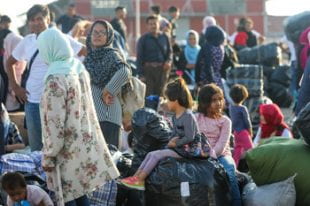Jeff Falk
713-348-6775
jfalk@rice.edu
Ensure migrant, refugees’ rights during coronavirus outbreak, says Baker Institute expert
HOUSTON – (April 2, 2020) – As borders close around the world in response to the novel coronavirus outbreak, and as increased nativism and fear provide fodder for anti-migrant and refugee agendas, there is a heightened imperative to ensure the rights of those who are unable to return to their home countries, according to an expert at Rice University’s Baker Institute for Public Policy.
In a new issue brief, Kelsey Norman, fellow for the Middle East at Rice University’s Baker Institute for Public Policy, examines developments involving the migration of asylum seekers and refugees from Turkey to Europe. The brief places recent migration policies, including the European Union’s transfer of border controls to foreign countries, in the context of the rapid spread of COVID-19.
In February, 33 Turkish military personnel were killed in an attack in Northern Syria. With European NATO allies unwilling to assist Turkey in the aftermath of the attack, the Turkish government began to allow migrants and asylum seekers to cross into Europe, violating the terms of the 2016 EU-Turkey migration deal.
On March 1, Greece decided to suspend all access to asylum for individuals entering the country — in violation of EU and international law — and to deport them as quickly as possible to countries of origin or third countries, said Norman, who is also director of the institute’s Women’s Rights, Human Rights and Refugees Program.
“Greek authorities are particularly concerned that as the weather improves in coming months, the arrival of asylum seekers and migrants will increase, leaving Greece to further manage the frontline of asylum arrivals with little EU support,” Norman wrote. “Greece’s containment policy since 2016, whereby asylum seekers are forced to remain in camps on Greece’s islands rather than travel to the mainland and potentially onto other EU countries, has left asylum seekers residing in dismal, unsanitary conditions.”
This recent standoff on the Turkish-Greek border has made it abundantly evident that the quick fix approach the EU sought to its 2015 refugee “crisis” via the EU-Turkey deal is highly volatile, Norman said.
“Rather than resolving its own internal political disagreements over responsibility sharing of refugees among EU states, the EU outsourced the solution to Turkey,” Norman wrote. “Yet of the €6 billion promised to Turkey in 2016, nearly €4.7 billion has been contractually awarded but only approximately €3.2 billion — roughly half — paid out.
“In addition to the slow pace of payments, Turkey has also been displeased with the method by which aid has been dispersed,” he wrote. “While the EU favors funding its humanitarian partner organizations operating in Turkey, the Turkish government would prefer to be funded directly. Progress on the other elements of the agreements — including reinstating EU access negotiations and discussions over a customs union — stalled after 2016 as Turkey declined further into autocratic governance.”
Norman concluded, “The process of externalizing borders and offshoring responsibility for refugees and asylum seekers has gained pace in recent years, but we should be especially wary of these types of tactics being deployed during global health crises, such as the one currently underway with the rapid spread of Covid19,” Norman wrote. “As researchers at the Migration Policy Institute have aptly stated, ‘Bold measures taken in the name of containing the spread of disease are often fig leaves for broader aims: reducing ‘undesirable’ migration and curtailing the openness that has been blamed for uncontrolled movements of asylum seekers and migrants.'”
To schedule an interview or for more information, contact Jeff Falk, director of national media relations at Rice, at jfalk@rice.edu or 713-348-6775.
-30-
Related materials:
Issue brief: www.bakerinstitute.org/media/files/files/94878647/bi-brief-033120-cme-migration.pdf
Norman bio: www.bakerinstitute.org/experts/kelsey-norman
Follow the Baker Institute via Twitter @BakerInstitute.
Follow Barn via Twitter @KelseyPNorman.
Follow Rice News and Media Relations via Twitter @RiceUNews.
Founded in 1993, Rice University’s Baker Institute ranks as the No. 2 university-affiliated think tank in the world. As a premier nonpartisan think tank, the institute conducts research on domestic and foreign policy issues with the goal of bridging the gap between the theory and practice of public policy. The institute’s strong track record of achievement reflects the work of its endowed fellows, Rice University faculty scholars and staff, coupled with its outreach to the Rice student body through fellow-taught classes — including a public policy course — and student leadership and internship programs. Learn more about the institute at www.bakerinstitute.org or on the institute’s blog, http://blog.bakerinstitute.org.


